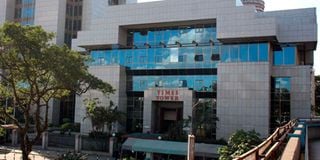Premium
KRA loses Sh2 billion on automation of bank services - PwC report

The Times Tower in Nairobi which houses the headquarters of the Kenya Revenue Authority (KRA). A court has ordered the Kenya Revenue Authority to pay a former employee Sh15 million in compensation for unlawfully dismissing him before rescinding the decision and retiring him in the public interest.
What you need to know:
- Irrecoverable VAT paid by banks declined by 16.2 per cent to Sh7.8 billion last year on the effect of increased automation and digitisation of banking services.
- Banks mainly incur the tax while running physical banking halls because they have to pay levies when footing service bills such as rent.
Accelerated automation of services by banks has dealt the taxman a big blow, denying it over Sh1.5 billion in taxes in 2021.
A new report released by consultancy firm PricewaterhouseCoopers (PwC) on behalf of the Kenya Bankers Association shows that irrecoverable value-added tax (VAT) paid by banks declined by 16.2 per cent to Sh7.8 billion last year on the effect of increased automation and digitisation of banking services.
Irrecoverable VAT refers to taxes banks incur when purchasing goods and services, which they do not recover since their customers are exempt from being charged VAT.
Banks mainly incur the tax while running physical banking halls because they have to pay levies when footing service bills such as rent.
“Irrecoverable VAT for the study participants declined by 16.20 per cent from 9.32 billion in 2020 to 7.81 billion in 2021. This was despite the resumption of the 16 per cent VAT rate from 14 per cent in 2020. This was the only category of tax analysed in this report that a reduction was noted and is the lowest irrecoverable VAT recorded since the inception of this study,” PWC said.
In an attempt to boost efficiency and cut costs, more banks have adapted technology and digital services—reducing reliance on the traditional physical banking halls.
Reduced ATMs
Banks have as result closed some physical branches and reduced their ATMs.
Latest data for example shows that the number of bank branches decreased from 1,502 in 2020 to 1,459 in 2021, which translates to a decrease of 43 branches while the number of ATMs decreased by 46 to 2,366 in December 2021, from 2,412 in December 2020.
“These factors may have led to reduced administrative expenses, specifically commercial rent, hence reducing the irrecoverable VAT incurred. The reduction in irrecoverable VAT may also be an indicator that the sector’s investment in the technology infrastructure required for digitalization substantially happened in periods before 2021” PWC said.
Analysts are projecting further squeezes on KRA’s traditional collections from banks as more financial institutions take up automated services.
Physical premises costs form a significant component of irrecoverable VAT as commercial rent attracts VAT, thus reducing premises has an impact on irrecoverable VAT for the banks.
The bankers said Nairobi County registered the highest decrease in the number of bank branches, with 33 of the 43 branches closed in the capital.
“This is indicative of new ways of working such as remote working and minimal travel costs due to reduced physical meetings,” the report said.
The irrecoverable VAT constituted 12.2 per cent of the total Sh63.9 billion in taxes borne by banks last year.
In 2019, before the Covid-19 pandemic struck, the banks incurred Sh9.9 billion in irrecoverable VAT, and they now say they even expect to trim it further, with the continued digitalisation and reduction of physical banking channels.
VAT resumption
The reduction was despite the resumption of a 16 per cent VAT rate from 14 per cent in 2020 when the government intervened in the Covid-19 surplus programme.
“This is the only tax category analysed in this report that reported a reduction in 2021 relative to 2020 largely due to a decrease in premises costs.
KRA remains under pressure to increase its collection performance amid rising demand for funds to finance key projects including healthcare, infrastructure, and education.
Aggressive tax collection and recovery measures by the taxman helped it rise collection by a fifth in the year to June 2022, the highest ever annual growth margin recorded by the agency.
The tax agency grew revenue by 21.7 per cent or Sh148.9 billion to hit Sh2.03 trillion, overtaking the previous high of 21 per cent seen in the 2006/2007 fiscal year.
This is the first time the country’s revenue has hit the Sh2 trillion mark, having tripled over the past 11 years, easing pressure on the Treasury in its efforts to close the budget funding gap, which stood at Sh1.03 trillion in the year ended June 2022.





